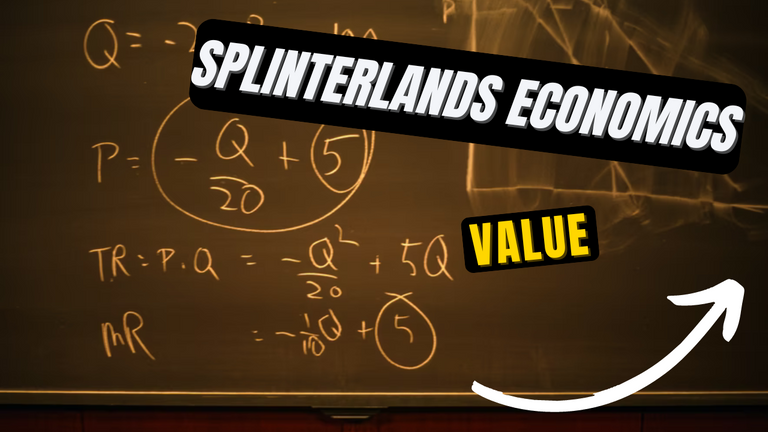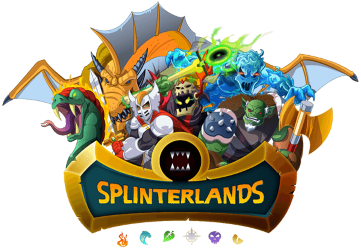Splinterlands Economics: Value
Hello everyone! We are back again today with another edition of Splinterland Economics - a series in which we introduce a basic economic concept and then apply it to Splinterlands. If this is your first time reading, just to tell you a little bit about myself: my day job is in an unrelated area but I consider myself a little bit of economics nerd - I read a little (or maybe way, way) more news than I should, double majored in econ, and am obsessed with optimization. I love the way Splinterlands is equal parts card game and resource allocation game. My goal with these articles is to share a little bit of what I know with you all.
Our subject today is a term that has many different uses and applications in multiple areas. In fact, you probably already use it yourself in everyday conversations - you may have heard it used to describe things as diverse as your combo meal at a fast food restaurant, or a common poker play. Despite how often you may hear about it, this is a topic where there is plenty to be gained from examining it more closely. Today, we will be talking about value!

What is value?
"Value" is probably a term that you see get thrown around a lot. Assets have a "value". People have "values". If you are familiar with poker, you may have even heard of a "value bet". But what exactly do we mean by "value"? Value refers to the amount that an object or item is worth - usually expressed in a monetary amount. For example, the value of an share of stock or a security is usually tied to the amount of income you can receive from holding it and/or reselling it in the future. The value of a good is generally highly correlated with the amount of enjoyment you obtain from consuming it - either in actual entertainment from the consumption or the prestige of having the item.
Values are specific to a person, company, or entity - nobody else can tell you exactly how much enjoyment you will receive from eating a steak, for example. But there is also the term "market value", which is used to refer to the market price of an item. Do note that individual value is not quite the same as the market price - an object can be valued at a higher level than its price tag! To quote Warren Buffet, "Price is what you pay, value is what you get."
In an "ideal" or "efficient" market, prices should generally be equal to values. But this is not an ideal world. When a good is sold for more than a producer would need to charge or for less than a consumer would be willing to play then that producer or consumer is said to be earning a "surplus" - that warm fuzzy feeling of joy you get when you find a good deal, and gain additional value.
How do we apply it to Splinterlands?
In Splinterlands, many of us have the goal of maximizing the value of our collections. When it comes to our personal transactions, then the way to achieve that goal should be clear - maximize our surpluses by buying things as cheaply as possible and selling things for the highest possible prices. Is there a specific card, crypto currency, or maybe even entire class of assets that seem undervalued by the market? You may be able to realize a larger amount of asset growth by shifting additional resources into that area.
It is important to recognize that everyone will have different priorities. For example, a leaderboard player may care more about cards which will help them win as soon as possible in order to get a higher placement in the current season. Players participating in different leagues may have different valuations of the same card. A player focusing on rental income may place a higher value on cards which will rent out well. A player operating a bot network may place a higher value on cryptocurrencies in order to make the costs of setting up the network back as soon as possible.
Recognizing how different players have different priorities allows us to better understand why unusual market behaviors occur. For example, a player looking to maximize long term collection value may find it strange that card prices spike when a card is first released, since anyone can wait until more cards are available and the price should (generally) decrease. But for other players which place a premium on being able to use a card more quickly, that higher price is well worth the cost because they place a higher value on having the card sooner. Similar differences in preferences can lead to players making dramatically different choices with their assets based on patience, appetite for risk, or degree of fear of missing out.
Why should we care?
One of the biggest decisions we can make while participating in markets is determining whether or not to participate at all - that is, whether we should buy or sell things, or if we should just stay where we are. Making the optimal choice in these situations requires us to be able to figure out our personal valuations of goods and currencies, and then compare the value that we place on particular items with the market price, or the price that may be offered to us in a particular transaction.
Understanding how we value things, as well as how other people value them, is vital in order to determine what a fair price is and is an enormous help in finding good "deals" or predicting what will happen to prices of assets in the future. If you can consistently find those deals and take advantage of them, then you will be well on your way to accumulating more assets and increasing your wealth.
Thank you so much for reading all the way to the end. Interested in seeing some more of my writing in the future? Be sure to give me a follow! In the meantime, if you'd like to see some of my recent posts:
A Soul-id Value Option - Using Soul Strangler in Battle! - Last week's battle challenge, featuring Soul Strangler!
Splinterlands Economics: Business Cycles - An introduction to buisiness cycles, and how understanding them can help us out in Splinterlands.
Setting Your Goals for Fun and Profit - A few simple steps to help you set and achieve your goals.
Thinking about giving Splinterlands a try but haven't signed up yet? Feel free to use my referral link: https://splinterlands.com?ref=bteim, and be sure to reach out to me if you have any questions!
All images used in this article are open source and obtained from Pixabay or Unsplash. Thumbnails borrowed with permission from the Splinterlands team or made in Canva.





Congratulations @bteim! You have completed the following achievement on the Hive blockchain and have been rewarded with new badge(s):
Your next target is to reach 150 posts.
You can view your badges on your board and compare yourself to others in the Ranking
If you no longer want to receive notifications, reply to this comment with the word
STOPTo support your work, I also upvoted your post!
Check out the last post from @hivebuzz:
Thanks for sharing! - @alokkumar121
